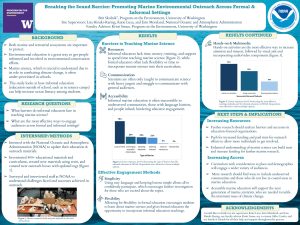Breaking the Sound Barrier: Promoting Marine Environmental Outreach Across Formal and Informal Settings
Environmental education is crucial for promoting environmental literacy, critical thinking, and environmentally positive behaviors across general audiences. It is important to understand both land and marine ecosystems. However, schools tend to prioritize terrestrial environmental science while neglecting marine science, even though the importance of marine education has long been recognized due to the fact that protecting marine ecosystems is key to reversing issues such as climate change and protecting fish populations that provide jobs and sustenance to many. Informal education, which occurs outside the classroom in settings such as science centers or aquariums, can improve students’ ocean literacy and promote behaviors that benefit marine life. This study aims to understand the barriers faced and successes achieved by informal educators in teaching marine science to general audiences. During my internship with the National Oceanic and Atmospheric Administration (NOAA) as an Education and Outreach intern, I surveyed NOAA staff about their outreach experiences and interviewed staff with heavy outreach and education responsibilities. Through these methods, I discovered that education and outreach endeavors often lack time and resources, hands-on activities are the most effective at getting students engaged, simplicity and easy language is key for maintaining attention, and the importance of making marine education equitable. Promoting accessible non-formal marine education has the potential to increase overall awareness, foster trust in marine science, and help nurture the next generation of marine and environmental scientists to address climate change and other environmental challenges.
